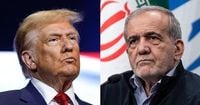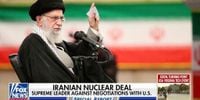In a week saturated with diplomatic drama and rising tensions, the world watched as the United States and Iran edged closer to a historic crossroads—one marked by bombed-out nuclear facilities, economic hardship, and a swirl of political maneuvering on both sides. The latest developments, unfolding just days before the United Nations is set to reimpose sweeping sanctions on Iran, have left global capitals on edge and ordinary Iranians bracing for more uncertainty.
It all began last week when President Donald Trump, in a move that stunned many in Washington and beyond, announced that negotiations with Tehran were imminent. According to The Independent, the first round of talks took place over the weekend in Oman, with a second round scheduled for this Saturday in Rome. The aim: to constrain Iran’s nuclear program and, perhaps, to stave off further military escalation in the region.
The diplomatic overture, however, was quickly complicated by hardline rhetoric and the ghosts of recent violence. As BBC reported, Iranian President Masoud Pezeshkian delivered a fiery speech at the United Nations on September 24, 2025, condemning the United States and Israel for their joint airstrikes on Iranian cities and nuclear facilities in June. Pezeshkian, holding up a book titled “Killed By Israel” filled with photos of families and children, called the attacks “a grave betrayal of diplomacy and a subversion of efforts towards the establishment of stability and peace.”
The June airstrikes were devastating. Between June 12 and 24, Israeli jets, reportedly with American logistical support, pounded Iranian nuclear sites at Fordo, Natanz, and Isfahan, using so-called “bunker buster” bombs for the first time in combat. The strikes killed more than 1,000 people, including nuclear scientists, military personnel, and civilians, according to Iranian state media. Iran responded with volleys of drones and missiles, but the damage was done: the country’s nuclear infrastructure was left in ruins, and its economy—already battered by years of sanctions—teetered on the brink.
The attacks, which Pezeshkian called “a grave betrayal of diplomacy,” came at a time when moderates in Tehran were quietly pushing for dialogue with Washington. But Supreme Leader Ayatollah Ali Khamenei, the true power in Iran, slammed the door shut. In a televised address on September 23, Khamenei declared, “Negotiating with America about the nuclear issue and maybe other issues is an absolute dead end.” He insisted that uranium enrichment was Iran’s “sovereign right” and argued that talks would only serve to give Trump a political victory, while delivering nothing but loss for Iran. “This negotiation will be beneficial for the current American president. He will hold his head high, say I threatened Iran and I brought them to the negotiating table. He will be proud of this in the world. But for us it’s an absolute loss and has no benefit,” Khamenei said, according to his official website.
Despite this hard line, voices within the Iranian establishment—especially among moderates—continued to call for direct talks with the U.S., hoping to stave off another round of devastating attacks. But Khamenei’s refusal to negotiate, coupled with his insistence on continuing uranium enrichment and his categorical rejection of any discussion about Iran’s ballistic missile program, left President Pezeshkian with little room to maneuver. The Iranian rial plunged to a record low against the U.S. dollar after Khamenei’s remarks, underscoring the economic pain felt by ordinary Iranians.
On the American side, the response was equally fraught. U.S. Middle East envoy Steve Witkoff tweeted, “Iran must stop and eliminate its nuclear enrichment and weaponization program,” a demand that Iranian Foreign Minister Abbas Araghchi immediately rebuffed, insisting that dismantling enrichment capabilities was “off the table.” The White House, for its part, insisted through an official statement to NBC News that “the United States remains available for direct engagement with Iran—in furtherance of a peaceful, enduring resolution to the Iran nuclear issue.”
But not everyone in Washington was on board. Former Secretary of State Mike Pompeo warned, “Any deal with the Islamic Republic of Iran must not only verifiably eliminate every element of its nuclear program, but must also crush its ballistic missile capability and its support of terror proxies around the world. Anything less is simply Obama redux.” Senator Lindsey Graham echoed these sentiments, demanding “the total dismantling of Iran’s nuclear infrastructure and...worldwide supervision.” He added, “I fear anything less could be a catastrophic mistake.”
President Trump, meanwhile, sought to thread the needle between hawks and doves. On September 25, speaking to reporters at the White House, he said, “I think that Iran has a chance to have a great country and to live happily without death.” Yet, as The New York Times revealed, Trump had personally vetoed U.S. support for an Israeli plan to strike Iranian nuclear facilities as soon as next month, signaling a preference for negotiation over escalation—at least for now.
This approach has not pleased everyone in Trump’s own party. The neoconservative wing, long supportive of military action against Iran, has found itself increasingly marginalized as Trump purges his administration of “maximum pressure” advocates and replaces them with loyalists more skeptical of foreign intervention. “The Trump Administration is George W. Bush’s third term, or not, and that’s his whole legacy,” wrote Curt Mills, executive director of The American Conservative. “So far, POTUS is sagely waving off this nonsense. But the stakes are that high.”
For Iranians, the stakes are indeed high—and growing. The June airstrikes not only devastated key infrastructure but also triggered a wave of repression at home. Security forces, under the pretext of rooting out spies, arrested at least 21,000 people during and after the war, according to Amnesty International. Many of those detained were ethnic and religious minorities, as well as Afghan migrants. At least nine people have been hanged since October 2023 on charges related to collaboration with Israel, reported the Oslo-based Iran Human Rights Organization. “They’re targeting already marginalized groups even further,” said Nassim Papayianni, an Iran campaigner at Amnesty International. “So essentially they are trying to use the conflict as a way to ramp up the crackdown and the arrests.”
As the September 28 deadline for the UN “snapback” sanctions approaches—sanctions that could freeze assets, impose an arms embargo, and restrict uranium enrichment—Iran’s options are narrowing. European leaders, including French President Emmanuel Macron, have held out hope for a last-minute diplomatic breakthrough, but time is running out. “An agreement remains possible. Only a few hours are left,” Macron wrote after meeting Pezeshkian in New York. “It is up to Iran to respond to the legitimate conditions we have set.”
With nerves fraying in Tehran and Washington alike, the coming days may prove decisive. Whether the world witnesses another spiral into violence or a breakthrough at the negotiating table will depend on leaders’ willingness to compromise—and the ability of ordinary people to endure yet another round of hardship.


